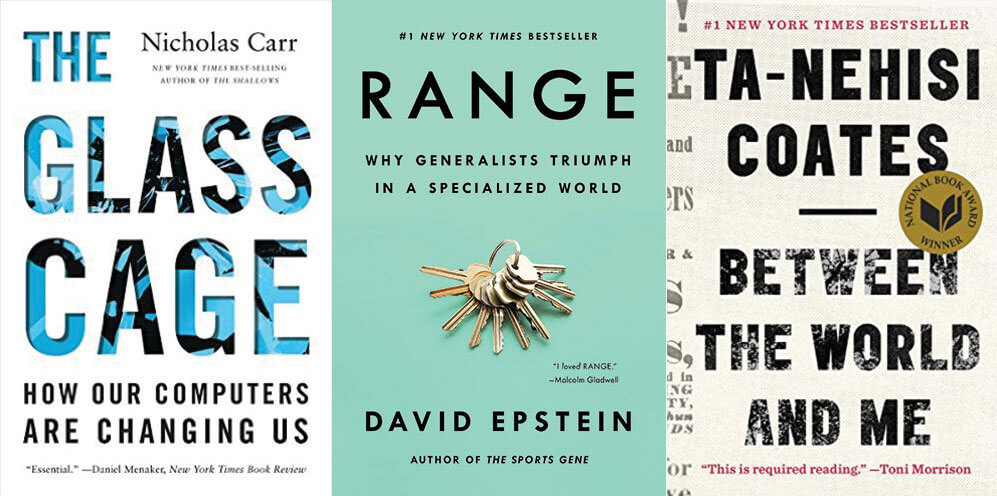
The Society of General Internal Medicine’s book club chose The Glass Cage (from left) in 2018, Range in 2020, and Between the World and me in 2019.
This case study is part of Convene‘s April CMP Series story looking at innovations in scientific and medical meetings.
Society of General Internal Medicine Annual Meeting
May 8–11, 2019 Washington Hilton Hotel, Washington, D.C. 3,000 attendees
“The session will be fun and we will all learn together.” “Fun” is not the usual adjective used to describe an educational session at a medical meeting. But it’s how the Society of General Internal Medicine (SGIM) website describes the Book Club session that has been offered at its Annual Meeting for the past few years.

Scott Mitchell Wright
As old timey as it may sound, the SGIM Book Club is “absolutely” one way to attract a wider — and younger — group of attendees, according to Scott Mitchell Wright, M.D. Wright, a professor of medicine at The Johns Hopkins University School of Medicine and director of the General Internal Medicine Division at Johns Hopkins Bayview Medical Center in Baltimore, has been an SGIM member since about 1994 and has been organizing the book club for several years.
“Health-care professionals were not making time to read ‘beyond medicine’ — particularly books,” Wright said. “Thus, we pitched the idea to the meeting planners and they loved it.”
Wright and his Johns Hopkins colleagues have also organized book clubs at other conferences, including at gatherings of the American Geriatrics Society, the Association for Academic Psychiatry, and the International Developmental Pediatrics Association. The books selected are nonfiction works, but not specific to medicine.
The book chosen for SGIM’s meeting each year, Wright said, has the potential to draw in particular subsets of attendees. For 2019, the choice was Between the World and Me by Ta-Nehisi Coates, written as a letter to the author’s teenage son about the realities of being black in the U.S. The year before, SGIM picked The Glass Cage: How Our Computers Are Changing Us by Nicholas Carr, described as a celebration of technology and a warning about its misuse, which “attracted attendees who were especially interested in technology and computers,” he said. For 2020’s meeting, which has been canceled, the book was to be Range: How Generalists Triumph in a Specialized World by David Epstein, which explores why it’s the generalists rather than the specialists who are primed to excel in many fields.
The book club is one of the one-hour concurrent SGIM sessions offered over lunch and is led by discussion facilitators. It draws about 100 people, Wright said, most of whom read the book ahead of time, but those who do not are nonetheless welcome. The first five minutes of the hour are spent giving a quick overview of the book to ensure everyone is, well, on the same page.
Why a book club? Wright and several colleagues explored that in a 2018 paper titled “What’s a book club doing at a medical conference?” “The prevalence of burnout among physicians in the United States now exceeds 50 percent, with many physicians feeling isolated and lacking in a sense of community,” the paper said. “Book clubs among colleagues may be one way to foster community and restore joy to medicine.”
As one SGIM participant noted in the 2018 paper: “It was refreshing for the soul to spend a session the way we did.”
Cristi Kempf is executive editor at Convene.
Earn One Hour of CE Credit
By reading this case study and the others found in the April Convene cover story, you will be ready to earn one hour of CE credit toward CMP certification from the Events Industry Council. To take an online test to earn that CE credit.
